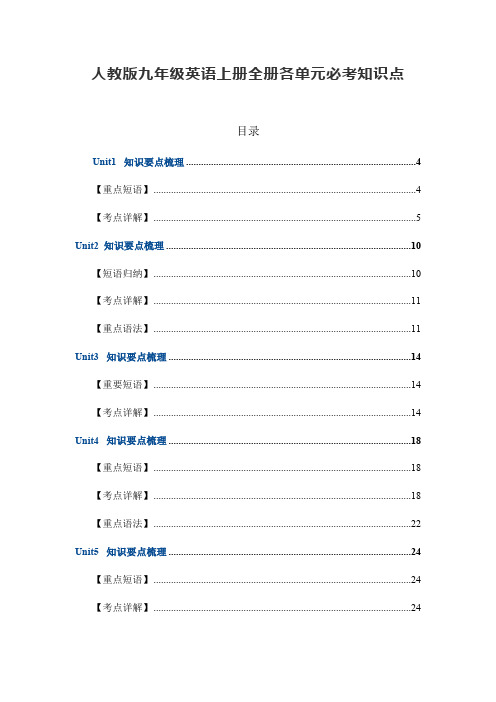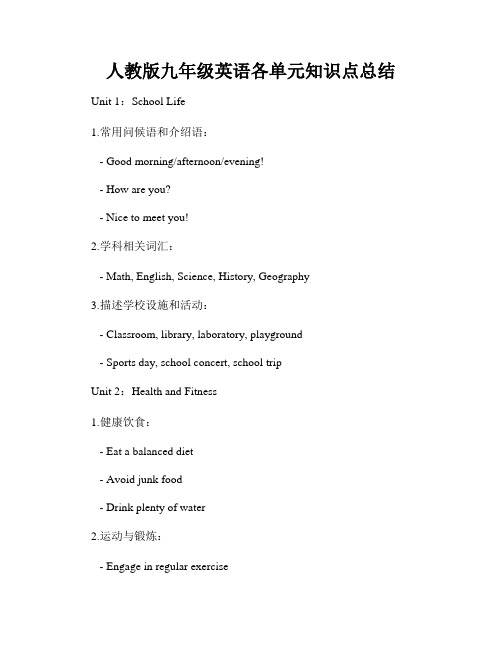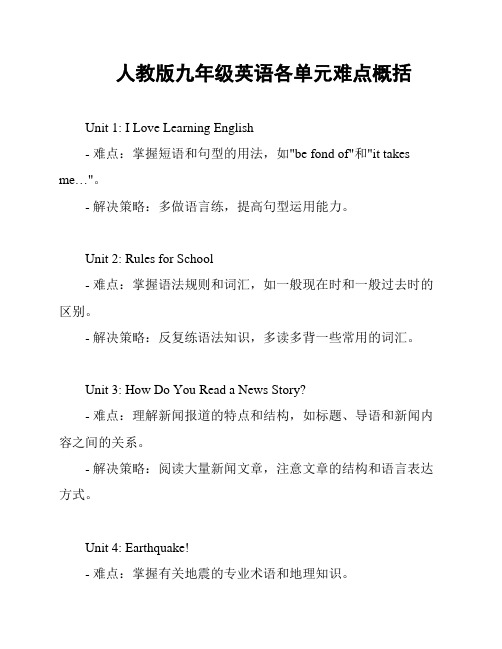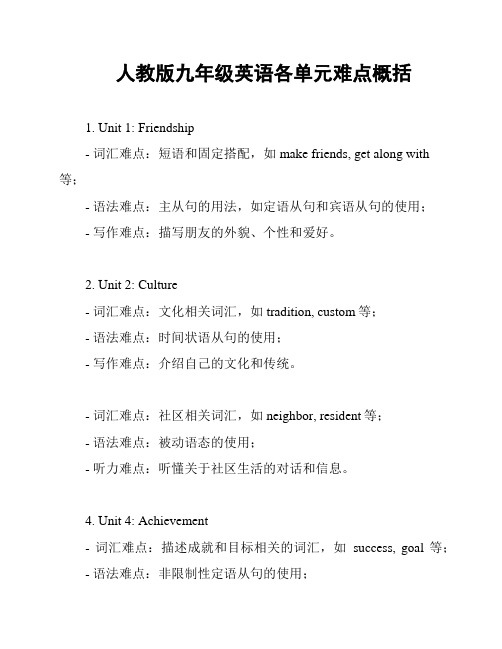人教版初三英语各单元知识点总结
人教版初三英语知识点总结

人教版初三英语知识点总结一、语法重点1. 时态- 一般现在时:表示经常发生的动作或状态。
- 一般过去时:表示过去发生的动作或状态。
- 现在进行时:表示正在进行的动作。
- 过去进行时:表示过去某一时刻正在进行的动作。
- 一般将来时:表示将来会发生的动作。
- 现在完成时:表示过去发生的动作对现在的影响或结果。
- 过去完成时:表示在过去某一动作之前已经完成的另一动作。
2. 语态- 被动语态:表示主语是动作的承受者。
- 一般现在时被动语态:am/is/are + past participle。
- 一般过去时被动语态:was/were + past participle。
- 现在进行时被动语态:am/is/are being + past participle。
- 一般将来时被动语态:will be + past participle。
3. 非谓语动词- 动名词:作为名词使用,表示动作。
- 分词:现在分词(表示正在进行)和过去分词(表示被动或完成)。
- 不定式:to + base form of verb,表示动作的目的、意图或结果。
4. 情态动词- can/could:表示能力或请求。
- may/might:表示可能性。
- must:表示必须或强烈义务。
- should/ought to:表示建议或应当。
5. 句子结构- 简单句:一个主语和一个谓语。
- 并列句:使用并列连词连接两个或多个简单句。
- 复合句:包含一个主句和至少一个从句。
- 定语从句:修饰名词或代词的从句。
- 状语从句:表示时间、地点、原因、条件、结果等。
二、词汇与短语1. 常见词汇- 描述人物特征的形容词:kind, honest, creative, etc.- 描述日常活动的动词短语:clean up, take out, turn off, etc.- 描述情感和情绪的名词:happiness, sadness, anger, etc. - 描述天气的词汇:sunny, rainy, windy, etc.2. 短语搭配- 动词短语搭配:finish doing, stop to do, remember to do, etc.- 形容词与介词的搭配:afraid of, interested in, good at, etc.- 常用口语表达:What's up?, How about…?, It's up to you, etc.三、阅读理解技巧1. 快速阅读(Skimming)- 快速浏览文章,抓住主旨大意。
九年级上册英语人教版笔记

九年级上册英语人教版笔记一、Unit 1 How can we become good learners?1. 重点单词。
- aloud:adv. 大声地;出声地。
例如:Read aloud so that we can all hear you.(大声朗读以便我们都能听到你。
)- pronunciation:n. 发音;读音。
Your pronunciation is very good.(你的发音很好。
)- patient:adj. 有耐心的;n. 病人。
Be patient with children.(对孩子们要有耐心。
)- expression:n. 表达(方式);表示。
Facial expressions can show our feelings.(面部表情能展示我们的感受。
)2. 重点短语。
- by doing sth.:通过做某事。
We can improve our English by reading English books.(我们可以通过读英语书提高英语。
)- make mistakes:犯错。
Everyone makes mistakes when they learn something new.(每个人在学习新东西的时候都会犯错。
)- look up:查阅;抬头看。
Look up the new word in the dictionary.(在词典里查阅这个新单词。
)3. 重点句型。
- How do you study for a test?(你如何为考试而学习?)- I study by working with a group.(我通过小组合作来学习。
)- The more you read, the faster you'll be.(你读得越多,你就会读得越快。
)二、Unit 2 I think that mooncakes are delicious!1. 重点单词。
人教版九年级英语上册各单元知识点归纳总结

人教版九年级英语上册全册各单元必考知识点目录Unit1 知识要点梳理 (4)【重点短语】 (4)【考点详解】 (5)Unit2 知识要点梳理 (10)【短语归纳】 (10)【考点详解】 (11)【重点语法】 (11)Unit3 知识要点梳理 (14)【重要短语】 (14)【考点详解】 (14)Unit4 知识要点梳理 (18)【重点短语】 (18)【考点详解】 (18)【重点语法】 (22)Unit5 知识要点梳理 (24)【重点短语】 (24)【考点详解】 (24)【重点语法】 (27)Unit6 知识要点梳理 (30)【重点短语】 (30)【考点详解】 (30)【重点语法】 (33)Unit1 知识要点梳理【重点短语】1. have conversation with sb. 同某人谈话2. too…to… 太……而不能3. the secret to… ……的秘诀4. be afraid of doing sth./ be afraid to do sth. 害怕做某事5. look up 查阅6. repeat out loud 大声跟读7. make mistakes in 在……方面犯错误8. connect ……with… 把……和……连接/联系起来9. get bored 感到厌烦10. be stressed out 焦虑不安的11. pay attention to 注意;关注12. depend on 取决于;依靠13. the ability to do sth.. 做某事的能力【考点详解】1. by + doing 通过……方式(by是介词,后面要跟动名词,也就是动词的ing 形式)2. talk about 谈论,议论,讨论The students often talk about movie after class. 学生们常常在课后讨论电影。
talk to sb= talk with sb 与某人说话3. 提建议的句子:①What/ how about +doing sth.? 做…怎么样?(about后面要用动词的ing形式,这一点考试考的比较多)如:What/ How about going shopping?②Why don't you + do sth.? 你为什么不做…?如:Why don't you go shopping?③Why not + do sth. ? 为什么不做…?如:Why not go shopping?④Let's + do sth. 让我们做…...吧。
人教版英语9年级1-5单元知识点总结

Unit 1How can we become good learners?单元知识背记手册◇Section A重点单词1. textbook 教科书;课本2. conversation 交谈;谈话3. aloud 大声地;出声地4. pronunciation 发音;读音5. sentence 句子6. patient 有耐心的;病人7. expression 表情;表示;表达方式8. discover 发现;发觉9. secret 秘密;秘诀;秘密的;保密的10. grammar 语法11. repeat 重复;重做12. note 笔记;记录;注意;指出13. chemistry 化学◇Section A重点短语1. listen to tapes听录音磁带2. have conversations with sb.同某人交谈3. give a report 作报告4. at first 起初;开始5. word by word 逐字逐句地6. be afraid to do sth.害怕做某事7. because of 因为8. fall in love with 爱上9. as well 也10. look up (在词典、参考书中或通过电脑)查阅;抬头看11. take notes记笔记12. keep a diary 记日记◇Section B重点单词1. pronounce 发音2. increase 增加;增长3. speed 速度4. ability 能力;才能5. create 创造;创建6. active 活跃的;积极的7. attention 注意;关注8. connect(使)连接;与……有联系9. review 回顾;复习10. knowledge 知识;学问◇Section B重点短语1. make mistakes 犯错误2. be born with 天生具有3. depend on 取决于;依靠,依赖4. be interested in对……感兴趣5. pay attention to 注意;关注6. connect…with 把……和……连接或联系起来7. think about 考虑8.even if 即使9.write down 写下;记下10.find out 找出;发现;弄清楚11.be stressed out 紧张的;有压力的12.bit by bit 逐渐地;一点点地13.instead of 代替;而不是◇词形变换1.pronounce→(名词)pronunciation2.expression→(动词)express3.discover→(名词)discovery4.memorize→(名词)memory5.wisely→(形容词)wise◇重点句型1.It's too hard to understand spoken English.理解英语口语太难了。
人教版九年级英语各单元知识点总结

人教版九年级英语各单元知识点总结Unit 1:School Life1.常用问候语和介绍语:- Good morning/afternoon/evening!- How are you?- Nice to meet you!2.学科相关词汇:- Math, English, Science, History, Geography3.描述学校设施和活动:- Classroom, library, laboratory, playground- Sports day, school concert, school tripUnit 2:Health and Fitness1.健康饮食:- Eat a balanced diet- Avoid junk food- Drink plenty of water2.运动与锻炼:- Engage in regular exercise- Participate in team sports- Stay active and fitUnit 3:Life in the Future1.将来时态:- 表示将来的时间状语:tomorrow, next week, in the future - 一般将来时的句型结构:主语 + will + 动词原形2.描述未来科技:- Flying cars, robots, virtual reality- Advanced medical technology, space travelUnit 4:Great People and Events1.描述历史人物和事件:- Martin Luther King Jr.- The Industrial Revolution2.过去完成时的用法:- 表示在过去某一时间之前已经完成的动作或状态- 句型结构:主语 + had + 过去分词Unit 5:Wonders of Nature1.自然现象及灾害:- Earthquakes, tsunamis, hurricanes- Aurora, rainbow, lightning2.介绍自然地理奇观:- The Grand Canyon, The Great Barrier Reef - Mount Everest, Niagara FallsUnit 6:Science and Technology1.科学与技术相关词汇:- Invention, experiment, microscope- Computer, smartphone, internet2.描述科学实验和发明:- Conduct experiments- Invent new gadgets and devicesUnit 7:Mysteries of the Mind1.描述情感和人类思维:- Happiness, sadness, anger, fear- Curiosity, imagination, creativity2.探讨心理学现象:- Dreams, memory, perception- Phobias, personality traitsUnit 8:Travel and Adventure1.旅行相关词汇:- Passport, suitcase, ticket, destination- Adventure, exploration, sightseeing2.介绍旅行目的地和经历:- Visit famous landmarks- Try local cuisine and experience different culturesUnit 9:Global Challenges1.全球问题与环境保护:- Climate change, pollution, deforestation- Recycling, renewable energy, conservation2.探讨解决方案和建议:- Reduce carbon emissions- Support sustainable development希望以上九个单元的知识点总结能对你有所帮助,这些知识将有助于你在英语学习中更好地理解和应用。
人教版九年级英语各单元难点概括

人教版九年级英语各单元难点概括Unit 1: I Love Learning English- 难点:掌握短语和句型的用法,如"be fond of"和"it takes me…"。
- 解决策略:多做语言练,提高句型运用能力。
Unit 2: Rules for School- 难点:掌握语法规则和词汇,如一般现在时和一般过去时的区别。
- 解决策略:反复练语法知识,多读多背一些常用的词汇。
Unit 3: How Do You Read a News Story?- 难点:理解新闻报道的特点和结构,如标题、导语和新闻内容之间的关系。
- 解决策略:阅读大量新闻文章,注意文章的结构和语言表达方式。
Unit 4: Earthquake!- 难点:掌握有关地震的专业术语和地理知识。
- 解决策略:研究地震的基本知识,如震中、震源和地震破坏。
Unit 5: Bicycles- 难点:理解和运用非谓语动词,如动名词和不定式。
- 解决策略:研究非谓语动词的用法和常见搭配,进行相关练。
- 难点:掌握一般将来时的用法和句式。
- 解决策略:多运用一般将来时进行日常语言交流,加深理解并熟练运用。
Unit 7: Will people have robots?- 难点:理解和表述将来可能发生的事情,运用将来时态。
- 解决策略:多参与讨论,提高表达能力,并结合实际情境练运用。
Unit 8: I'll help clean up the city parks.- 难点:掌握情态动词的用法,如"should"和"will"。
- 解决策略:阅读和听力练,多注意情态动词在不同语境中的意义。
Unit 9: When was it invented?- 难点:了解并陈述一些发明和发现的历史背景。
- 解决策略:积累相关知识,多阅读和研究历史资料。
以上是人教版九年级英语各单元的难点概括,针对每个单元的难点,可以采取相应的解决策略进行学习和练习。
人教版九年级全册英语1-8单元知识点期末复习提纲

人教版九年级全册英语1-8单元知识点复习提纲第一单元1.so that引导结果状语从句时,从内容上看主句和它引导的结果状语从句有因果关系,主句为因,从句为果。
He got up late so that he didn't catch the first bus.他起床晚了以致于他没有赶上第一班车。
(表结果)so...that...和such...that...意为“如此……以致于……”,引导结果状语从句。
(1)so +形容词/副词+ that +从句This story is so interesting that I want to read it again.这个故事如此有趣,以致于我想再读一次。
He spoke so quickly that I couldn't follow him.他说得如此快,以致于我跟不上他。
(2)so+形容词+ a/an +单数可数名词+ that +从句She is so lovely a girl that everyone loves her.她是如此可爱的一个女孩, 以致于每个人都喜欢她。
(3)“such+ a/an+形容词+单数可数名词+that+从句”以及“such+形容词+复数可数名词/不可数名词+that+从句”She is such a lovely girl that everyone loves her.她是如此可爱的一个女孩,以致于每个人都喜欢她。
Those are such beautiful flowers that the girl wants to pick them.那些花是如此漂亮,以致于女孩想要摘下它们。
2.look for寻找-Let's look for the lost child. -OK.-我们一起寻找丢失的孩子吧。
-行。
look after照顾;近义词组有take care of和care for。
人教版九年级英语各单元难点概括

人教版九年级英语各单元难点概括1. Unit 1: Friendship- 词汇难点:短语和固定搭配,如make friends, get along with 等;- 语法难点:主从句的用法,如定语从句和宾语从句的使用;- 写作难点:描写朋友的外貌、个性和爱好。
2. Unit 2: Culture- 词汇难点:文化相关词汇,如tradition, custom等;- 语法难点:时间状语从句的使用;- 写作难点:介绍自己的文化和传统。
- 词汇难点:社区相关词汇,如neighbor, resident等;- 语法难点:被动语态的使用;- 听力难点:听懂关于社区生活的对话和信息。
4. Unit 4: Achievement- 词汇难点:描述成就和目标相关的词汇,如success, goal等;- 语法难点:非限制性定语从句的使用;- 阅读难点:理解关于成功人士的文章和资料。
5. Unit 5: Environment- 词汇难点:环境保护相关词汇,如pollution, recycling等;- 语法难点:情态动词的使用;- 写作难点:写一篇关于环境保护的文章。
6. Unit 6: Entertainment- 词汇难点:与娱乐相关的词汇,如concert, performance等;- 语法难点:直接引语和间接引语的转换;- 听力难点:听懂有关娱乐活动的对话和信息。
7. Unit 7: Technology- 语法难点:虚拟语气的使用;- 阅读难点:理解关于科技发展的文章和报告。
8. Unit 8: Health- 词汇难点:与健康相关的词汇,如exercise, diet等;- 语法难点:情态动词和情态动词的一般疑问句;- 听力难点:听懂与健康生活方式相关的对话和广播。
9. Unit 9: Future- 词汇难点:与未来相关的词汇,如dream, plan等;- 语法难点:虚拟语气的运用;- 写作难点:描述自己的未来计划。
- 1、下载文档前请自行甄别文档内容的完整性,平台不提供额外的编辑、内容补充、找答案等附加服务。
- 2、"仅部分预览"的文档,不可在线预览部分如存在完整性等问题,可反馈申请退款(可完整预览的文档不适用该条件!)。
- 3、如文档侵犯您的权益,请联系客服反馈,我们会尽快为您处理(人工客服工作时间:9:00-18:30)。
初三英语各单元知识点详细总结Unit 1一、知识点1.Check in : 在旅馆的登记入住。
Check out: 在旅馆结账离开。
2.By: ①通过…..方式(途径)。
例:I learn English by listening to tapes.②在…..旁边。
例:by the window/the door③乘坐交通工具例:by bus/car④在……之前,到……为止。
例:by October在10月前⑤被例:English is spoken by many people.3.how与what的区别:how通常对方式或程度提问,意思有:怎么样如何,通常用来做状语、表语。
what通常对动作的发出者或接受者提问,意思为什么,通常做宾语,主语。
①How is your summer holiday? It’s OK.(how表示程度做表语)②How did you travel around the world? I travel by air.③What do you learn at school? I learn English, math and many other subjects.①What…think of…? How…like…?②What…do with…? How…deal with…?③What…like about…? How…like…?④What’s the weather like today? How’s the weather today?⑤What to do? How to do it?what I should do with how I should deal with it.What do you like about China?=How do you like China?I don’t know what to do next step?=I don’t know how to do it next step?㊣What good / bad weather it is today!(weather为不可数名词,其前不能加 a )㊣What a fine / bad day it is today! (day为可数名词,其前要加 a )4. aloud, loud与loudly的用法: 三个词都与"大声"或"响亮"有关。
①aloud是副词,重点在出声能让人听见,但声音不一定很大,常用在读书或说话上。
通常放在动词之后。
aloud没有比较级形式。
如: He read the story aloud to his son.他朗读那篇故事给他儿子听。
②loud可作形容词或副词。
用作副词时,常与speak, talk, laugh等动词连用,多用于比较级,须放在动词之后。
如:She told us to speak a little louder. 她让我们说大声一点。
③loudly是副词,与loud同义,有时两者可替换使用,但往往含有令人讨厌或打扰别人的意思,可位于动词之前或之后。
如:He does not talk loudly or laugh loudly in public. 他不当众大声谈笑。
5. voice 指人的嗓音也指鸟鸣。
sound 指人可以听到的各种声音。
noise 指噪音、吵闹声6. find + 宾语+ 宾补(名词形容词介词短语分词等)例:I find him friendly. I found him working in the garden.We found him in bed. He found the window closed.We found her honest.7. 常见的系动词有:①是:am 、is、are②保持:keep、stay③转变:become、get、turn④ ……起来feel、look、smell、taste、sound8. get + 宾语+宾补(形容词过去分词动词不定式)使某种情况发生例:Get the shoes clean. 把鞋擦干净Get Mr. Green to come. 让格林先生进来I want to get my bike repaired. 我想去修自行车You can’t get him wait ing. 你不能让他老等着9. 动词不定式做定语①与所修饰的名词构成主谓关系The next train to arrive was from New York. He is always the first to come.②与所修饰的名词构成动宾关系I have nothing to say. I need a pen to write with.I need some paper to write on. I don’t have a room to live in.10. practice , fun 做名词为不可数名词11. add 补充说又说12. join 加入某团体并成为其中一员attend 出席参加会议或讲座join in与take part in指参加到某项活动中去。
13.all、both、always以及every复合词与not连用构成部分否定。
其完全否定为:all---none, both---neither, everything---nothing, everybody---nobody.14. be afraid of doing sth. / sth.害怕be afraid of being alonebe afraid to do sth.害怕be afraid that恐怕担心,表示委婉语气15.either:①放在否定句末表示“也”②两者中的“任一”③either…or…或者…或者.…引导主语部分,谓语动词按照就近原则plete完成,是个较正式的词,后不能接动名词finish指日常事物的完成17.a,an 与序数词连用表示“又一”,“再一”。
例:Please give me a second apple. There comes a fifth girl.18.have trouble/difficult/problem (in) doing….. 干…..遇到麻烦,困难19.unless 除非,如果不,等于“if not”本身就表示否定,引导条件状语从句,主句为将来时,条件状语从句用一般现在时表示将来。
例:My baby sister doesn’t cry unless she’s hungry.=My baby sister doesn’t cry if she isn’t hungry.Unless you take more care, you’ll have an accident.如果你不多加小心的话,你会出事的。
20.instead: adv. 代替,更换。
例:We have no coffee, would you like tea instead?我们没有咖啡了,改喝茶好吗?It will take days by c ar, so let’s fly instead.开车去要好几天呢,咱们还是坐飞机吧。
Tom was ill, so I went instead.汤姆病了,所以换了我去。
instead of doing sth. 作为某人或某事物的替换例:Let’s play cards instead of watching TV.We sometimes eat rice instead of potatoes.Give me the red one instead of the green one.21.spoken 口头的,口语的。
spoken English 口头英语speaking 讲话的,说某种语言的。
Speaking skills讲英语的能力22. 提建议的句子:①What/ how about +doing sth.? 如:What/ How about going shopping?②Why don’t you + do sth.? 如:Why don’t you go shopping?③Why not + do sth. ? 如:Why not go shopping?④Let’s + do sth. 如:Let’s go shopping⑤Shall we/ I + do sth.? 如:Shall we/ I go shopping?23. a lot 许多常用于句末如:I eat a lot. 我吃了许多。
24. too…to 太…而不能常用的句型too+adj./adv. + to do sth.如:I’m too tired to say a nything. 我太累了,什么都不想说。
25. not …at all 一点也不根本不如:I like milk very much. I don’t like coffee at all.我非常喜欢牛奶。
我一点也不喜欢咖啡。
not经常可以和助动词结合在一起,at all 则放在句尾26.be / get excited about sth.=== be / get excited about doing sth.=== be excited to do sth. 对…感兴奋如:I am / get excited about going to Beijing.===I am excited to go to Beijing. 我对去北京感到兴奋。
27. ① end up doing sth 终止做某事,结束做某事如:The party ended up singing. 晚会以唱歌而结束。
② end up with sth. 以…结束如:The party ended up with her singing. 晚会以她的歌唱而告终。
28. first of all 首先. to begin with 一开始later on 后来、随29. also 也、而且(用于肯定句)常在句子的中间either 也(用于否定句)常在句末too 也(用于肯定句) 常在句末=as well30. make mistakes 犯错mistake sb. for …把……错认为……make mistakes (in) doing sth. 在干某事方面出错by mistake 错误地;由于搞错mistake---mistook----mistaken如:I often make mistakes. 我经常犯错。
